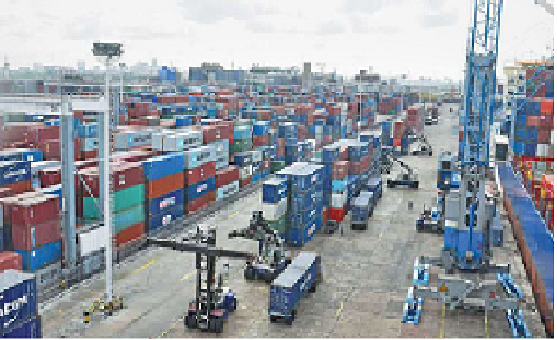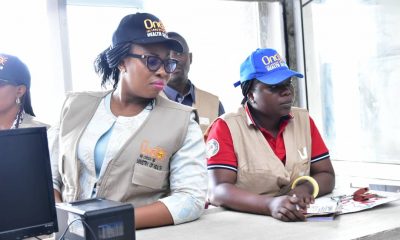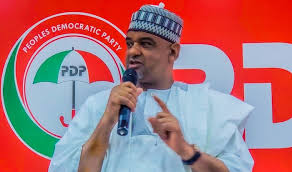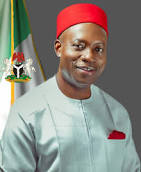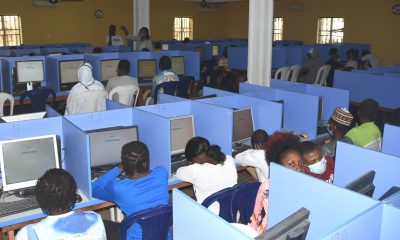NEWS
Group Backs Students With Disabilities, Distributes Learning Materials in Nasarawa

From Abel Zwanke, Lafia
The Maikaya Development Foundation (MDF) has distributed thousands of exercise books to indigent students in Nasarawa State and renewed its advocacy for inclusive education, urging stakeholders to prioritize access for students living with disabilities in higher institutions.
The official distribution ceremony, which took place at the Faculty of Education, Nasarawa State University, Keffi, brought together student union leaders, academic representatives, and other stakeholders from the education sector. Speaking at the event yesterday, the CEO of of the foundation Dr. Muhammed Maikaya represented by the Operation Manager, Hon. Shuaibu Sani said the gesture was aimed at easing the financial burden on students and encouraging them to remain focused on their academic goals.“This distribution is not just about writing materials, it is a reaffirmation of our belief that every student, regardless of status, deserves the tools and support needed to succeed,” the spokesperson said. “We are committed to ensuring no student is left behind.”Student leaders who spoke during the event expressed deep appreciation to the foundation for its consistent support and investment in the academic wellbeing of students.Comrade Ovey Abimiku, President of the Nasarawa State Students Association (NASSA), “Maikaya Development Foundation continues to show us what it means to be a true partner in education. This is a welcome intervention that will help many students who can’t afford basic learning materials.”Also speaking, Comrade Tabitha Jatau, State Coordinator of the Association of Nigerian Female Students (ANFS), praised the foundation’s longstanding dedication to youth empowerment.“MDF has not only provided these writing materials but has also supported students with scholarship and tuition funds for many years. We are grateful for this rare consistency,” she noted.Recall that weeks earlier, the foundation had supported over 500 students across the state with Education Support Funds to assist with the payment of tuition fees and levies—an annual intervention that has benefitted thousands over the past decade.In addition to its material support, the foundation has continued to advocate for inclusive education policies in the state. During a recent stakeholders’ engagement themed “Breaking Barriers and Promoting People with Special Needs’ Inclusion in Higher Institutions”,Maikaya had called on government and educational institutions to prioritize the rights and needs of students living with disabilities.“The truth is, barriers—both seen and unseen—still prevent many of our brothers and sisters with special needs from accessing quality education,” Maikaya said at the event. “These are not just inconveniences. They are injustices. And they must be corrected.”He recommended several critical steps to advance inclusive education, including accessible infrastructure, adapted learning materials, disability awareness training for academic staff, and policy implementation at all levels.“Inclusive education is not optional, it is essential for real development,” He added. “We have seen the power of what can happen when potential meets opportunity. Now we must ensure that people with disabilities have equal access to those opportunities.”He urged stakeholders, government agencies, private sector actors, NGOs, and civil society groups, to collaborate in making inclusive education a reality in Nasarawa and beyond.“This is not a matter of charity. It is about equity, dignity, and human rights,” the speaker emphasized. Items that were distributed including learning materials, 20, 50kg bags of rice, 20 cartons of Noddles and cash support of 200,000 thousand Naira to students living with disabilities while advocating for inclusion gain tract, educational reform and youth empowerment in Nasarawa State.EndNEWS
MESG Champions Catalytic Capital to Transform Nigeria’s Healthcare System
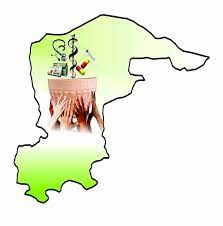
By Sheriff Aderibigbe
On Thursday, 14th August 2025, the Nigerian Economic Summit Group (NESG), through its Health Policy Commission, convened a high-level Pre-Summit dialogue themed “Catalytic Capital for Healthcare: Bridging Nigeria’s Systemic Gaps.” The event brought together senior policymakers, investors, and healthcare executives to explore how innovative, risk-tolerant financing models can strengthen Nigeria’s healthcare sector, bridge systemic gaps, and drive inclusive growth.
In her welcome address, Dr. Mories Atoki, Facilitator of the NESG Health Policy Commission, highlighted the urgent need for strategic partnerships to achieve Universal Health Coverage (UHC). She identified brain drain and underinvestment in diagnostics as critical challenges, stressing that affordable, quality diagnostics are essential for early detection, cost-effective treatment, and improved outcomes. Dr. Atoki noted that catalytic capital which is strategic, risk-tolerant funding can de-risk early-stage projects, attract private investment, and unlock systemic change across the healthcare value chain, from primary care and infrastructure to local manufacturing.Dr. Richardson Ajayi, in his opening remarks, posed a key question: “What is worth investing in?” He described the private healthcare sector as fragmented and dominated by individual practitioners, limiting large-scale investment opportunities. He pointed out that health insurance penetration remains low, with 70–80% of healthcare costs paid out of pocket, while limited local manufacturing forces heavy reliance on imports which he described as an unsustainable approach amid foreign exchange challenges.Delivering the keynote address, Ms. Fola Laoye, Co-Founder and CEO of Iwosan Investments Limited, underscored the importance of risk-tolerant financing in attracting sustainable private sector participation. She noted that Nigeria’s healthcare market, valued at approximately ₦40 trillion ($15–20 billion), is projected to grow by 7–8% annually. She proposed the creation of an African Health Fund to reduce aid dependence and recommended allocating 25% of health insurance funds to infrastructure, establishing a sustainable capital base for the sector.A panel session moderated by Dr. Ayodele Cole Benson, Thematic Lead for Health as a Business at NESG, examined strategies to scale local medical manufacturing, reduce import dependence, and attract private investment. Ms. Olufunke Falade of the Nigeria Sovereign Investment Authority (NSIA) outlined efforts to supply raw materials such as APIs and excipients to support local producers. Dr. Austin Okogun, CEO/MD of Lily Hospital Group, discussed private sector-led healthcare innovation.Managing Director of the MTN Foundation, Mrs. Odunayo Sanya reaffirmed the organisation’s commitment to sustainable development, describing its healthcare interventions as a “statement of faith” rooted in the belief that partnerships are vital for lasting impact. She noted that the Foundation actively seeks collaboration opportunities, recognising that no single entity can address systemic challenges alone. Drawing on MTN’s broader CSR track record—including infrastructure projects such as road construction, she highlighted the organisation’s readiness to leverage its resources, networks, and data to catalyse change. She added that MTN’s sustained investment in community health has created a platform for other corporate players to join the effort, amplifying the impact of catalytic capital.Participants agreed that strengthening Nigeria’s healthcare system is both a public health necessity and a driver of human capital development, economic productivity, and equitable growth. The dialogue also facilitated direct engagement between investors and healthcare providers, paving the way for future partnerships.The Pre-Summit dialogue forms part of the build-up to the 31st Nigerian Economic Summit (NES #31), themed “The Reform Imperative: Building a Prosperous and Inclusive Nigeria by 2030,” scheduled for October 6–8, 2025, at the Transcorp Hilton, Abuja. NES #31 will bring together leaders from government, business, and civil society to define reform priorities and pathways to shared prosperity.*Mr Aderibigbe is of NESG Corporate Communications DepartmentNEWS
Tinubu’s Record 40th International Trip in 26 Months Disturbing, Says ADC
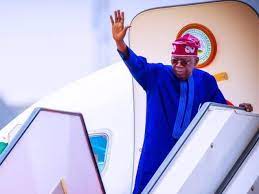
By Mike Odiakose, Abuja
Opposition African Democratic Congress (ADC) has criticised President Bola Ahmed Tinubu for what it described as an “excessive foreign travel culture” that has left him absent from the country for nearly a quarter of his presidency. In a statement by Mallam Bolaji Abdullahi, the National Publicity Secretary of the ADC, the party noted that President Tinubu has spent about 181 days abroad since assuming office 26 months ago and this latest trip is the 40th in 26 months, a new record for any Nigerian or African leader in recent memory.
The party describes the trips as wasteful, in the absence of any tangible economic or diplomatic gains from the president’s previous travels, and also disturbing as it fuels potentially damaging rumours.”The African Democratic Congress (ADC) wishes to once again draw the attention of all Nigerians to the alarming frequency with which President Bola Ahmed Tinubu is absent from the country, at a time when leadership at home is needed more than ever.”Today, President Tinubu will depart Abuja for yet another foreign tour. By public records, this will be the President’s 40th foreign trip since assuming office, spending a cumulative total of around 181 days abroad, the equivalent of almost six full months. “This means that in the 26 months he has been President, nearly 25 percent of his time has been spent outside the country. “During this trip, President Tinubu is on track to make his 41st international stop before setting foot in most Nigerian states. “Since inauguration, President Tinubu has only visited 13 out of 36 States, but has visited more foreign countries during the same period. This is not good. “Moreso, considering that there are no real economic gains for the junkets despite the billions of Naira spent per day and per trip.”Set against the growing insecurity that claims the lives of an average 30 Nigerian each day, and widespread poverty that have left majority of citizens in misery, this frequent flier presidency stands in stark contrast and as a testament to a government that no longer cares what the people think or feel. “From Benue to Zamfara and other parts of our country, taxes are being imposed by bandits, citizens are being slaughtered in their homes, millions are facing economic hardship and the population of malnourished children has continued to grow. “Nigerians expect their President to be on ground to provide leadership, empathy, and direction. “However, it would appear that the President thinks that there are more serious problems for him to solve outside the country or he believes the solutions to the many troubles we face at home could actually be found on these trips abroad. “It is important to note that since August 1, 2025, the President had disappeared from public view for more than a week. This had sparked widespread rumours that the President was sick. “Fortunately, the presidency issued a statement, assuring the nation that the President is as fit as a fiddle. But this is not enough. “Rumour of a sick president, or even mere conversations that could raise doubts about the state of the President’s health are potentially damaging to the economy, could discourage potential investors, further embolden our enemies. “Therefore, it is not good enough to say the President was working hard from home or from any secret hideouts. “Whenever a president drops out of sight without an explanation, it gives rise to all kinds of damaging rumours. And a one-day cameo appearance that looked stage-managed, followed immediately by yet another foreign trip, without a clearly stated date of return is not going to help in quelling such rumours. “Perhaps, if the President had heeded our persistent call to him to appoint ambassadors he would not have a need to accept every invitations or to personally attend every meeting. “For avoidance of doubts, all these meetings, even with the best of intentions, are not likely to yield any real benefits to Nigeria without ambassadors to follow up on agreements reached. “In this regard, the ADC wishes to reiterate that: Nigeria deserves a President who is present. While millions of our citizens are suffering, our leaders cannot afford to treat governance like a part-time job.’NEWS
Ward-based development plan will ensure reform benefits reach the people – Bagudu

By Tony Obiechina Abuja
Minister of Budget and Economic Planning, Senator Abubakar Bagudu on Thursday explained that the Renewed Hope Ward Development Programme, recently launched by President Bola Tinubu, is designed to ensure that the people experience the benefits of the ongoing economic reforms.
The minister stated this during a courtesy visit to his office in Abuja by the President of the Institute of Chartered Accountants of Nigeria, Dr Haruna Nma Yahaya. He said that the plan, which would engage over 10 million economically active persons across the 8,809 wards nationwide, aims to go beyond palliatives to achieve genuine empowerment by directing development efforts at the grassroots level.“Each of our 8,809 wards is unique—with people fishing, farming, mining and food processing—but they are limited by access to capital and support. If we can unlock entrepreneurship at that level, the benefits of reform will be more evenly shared,” Bagudu further explained.The minister emphasised that this would boost economic activities at the grassroots, catalyse the federal government’s drive to increase revenue and achieve the $1 trillion economy target by 2030.He stated that the reforms under the Renewed Hope Agenda aimed to address the country’s economic stagnation, which resulted from decades of underinvestment in vital sectors of the economy.”Our current reality is that we are not where we want to be, and Mr. President has made that clear. But instead of playing the blame game, we are making long-overdue choices—difficult decisions similar to what accountants make when restructuring troubled companies. It’s no different with a country,” Bagudu stated.He called for private sector support for the reforms, noting that the nation’s long-term plan, Nigeria Agenda 2050, which involves all levels of government and the private sector, aims for a $33,000 per capita income by 2050. Achieving this, he explained, will require over $100 billion in annual investments, 86% of which should come from private entities.The Minister emphasised that reaching this vision will require more than just government effort. He described ICAN’s support as vital — not only for technical contributions but also for helping to communicate reforms to Nigerians and fostering broad-based trust in the reform process.“The ability to mobilise all stakeholders—especially those who understand complex issues through training, like your members—is what gives reforms their staying power,” he said, explaining, “We need you to help us communicate these reforms to citizens. People want quick results, and it’s our collective duty to explain that some of the changes we’re making today are foundational for the prosperity we seek tomorrow.”Bagudu appreciated ICAN’s consistent engagement with the ministry and welcomed the call for support and partnership from the Institute, while noting that the economic reforms of President Bola Ahmed Tinubu could not have been achieved without the backing of institutions like ICAN.Speaking earlier, ICAN President Yahaya praised the minister for his exemplary leadership in guiding the ministry, noting that during his tenure, the ministry had achieved significant progress in budget implementation, including the expansion of infrastructural development across the country.He requested a partnership with the ministry to provide capacity building and technical assistance through robust financial and strategic management tools, as well as programmes for Accounting Officers focusing on ethical governance and anti-corruption.




